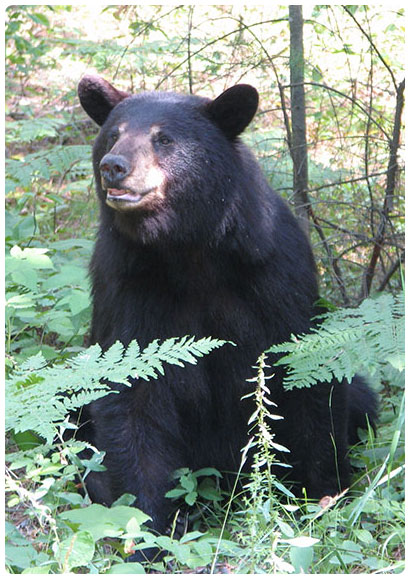
Seeing a black bear can be an exciting, and for some people, a nerve-wracking event.
These recommendations are meant to be general and cover the basic types of human-bear interactions that can occur. Encounters vary greatly, and all situations are different.
Black bears are large, strong wild animals that should be treated with respect and appreciated from a distance to ensure your safety as well as the bear’s.
In general, when you encounter a black bear you should:
- Remain calm.
- Ensure the bear has an escape route.
- Back away when possible.
- If attacked in a building or tent, immediately fight back.
- DO NOT run from a bear.
- DO NOT climb trees to escape a bear.
- DO NOT feed bears.
Bear Spray
Bear spray is a pepper spray specifically made as a bear deterrent and can be an effective tool if you encounter an aggressive bear. For bear spray to be effective you must be trained and practiced in its safe use. Be aware of local laws and regulations that may restrict the carrying or use of bear spray.
If you have questions about these recommendations, please contact our bear biologist at fwinformation@vermont.gov
What if...
You Encounter a Bear While in a Natural Setting
When the bear is unaware of your presence you should:
- Quietly back away from the bear and leave the area.
- DO NOT approach the bear.
When the bear is aware of your presence and is uninterested you should:
- Quietly back away from the bear and leave the area.
- DO NOT approach the bear.
When the bear is curious and continues to look in your direction, smells the air, or slowly approaches you should:
- Talk in a calm voice while slowly backing away from the bear.
- DO NOT approach the bear. If the bear is defensive it may:
- Make vocalizations which can include huffing and jaw popping.
- Retreat up a tree.
- Swat at the ground or tree.
- Lower its head with ears flattened, and sways back and forth.
When the bear is defensive you should:
- Begin repeating "Hey bear" in a calm voice.
- Back away and leave the area.
If the bear continues to be defensive or becomes aggressive it may:
- Approach you.
- Begin to follow you.
- Charge you.
When the bear is aggressive you should:
-
Make yourself look bigger by putting your arms above your head. Continue to repeat "Hey bear" in a calm voice. Back away and leave the area.
-
If it continues to follow you, stand your ground, make yourself look bigger, shout at the bear, threaten the bear with whatever is at hand (bang a stick on the ground, clap your hands), and prepare to use bear pepper spray if it is available. Back away and leave the area.
-
If charged, stand your ground, talk to the bear in a calm voice and use bear pepper spray when available. If the bear makes contact with you, fight back using anything you have (e.g. stick, binoculars, etc.).
You Encounter a Bear in Your Backyard
Encountering a bear in a backyard is a common occurrence in some areas because bears are often attracted to bird feeders, trash, pet food, etc.
If you find a bear in your yard you should:
- Make loud noises (for example shouting or banging pots and pans) to deter the bear from the area.
- DO NOT approach the bear.
- After the bear leaves, be sure to keep trash in a secure container or locked in an outbuilding, bring in bird feeders and pet food, and remove any other potential attractants.
You Surprise a Bear
If you accidentally surprise a bear that is in a garbage can, unseen around a corner, or in your home you should:
- Back away slowly while repeating "Hey bear" in a calm voice. Leave the area.
- Give the bear a clear escape route and do not corner it.
- If it is in your house or an outbuilding, do not lock the bear in a room. Instead, leave doors open as you exit the house.
- DO NOT approach the bear or try to make contact with the bear.
Your Dog is Attacked by a Bear
- DO NOT attempt to separate the bear and your dog.
- Make loud noises such as shouting and clapping.
- If available, spray the bear with a hose while remaining at a safe distance.
- Once the bear retreats retrieve your dog, slowly back away and leave the area.
